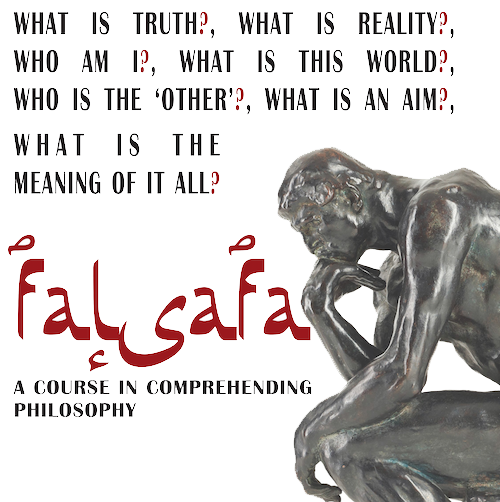-
About Falsafa:
Falsafa is a course in comprehending philosophy. It was launched for the first time in the July’ 2016 module. Philosophical ideas in this module were discussed in reference to works of Friedrich Nietzsche, the poetry of J.W. Goethe's Faust, Jai Shankar Prasad's Kamayani and also the Bhagwad Geeta.
The aim is not to impart a history of philosophy or to conduct an academic discussion on the views of a particular philosopher or thinker; rather it is to encourage philosophical thought in an individual so that he or she can be enabled to orient self. Therefore, it is through pieces of poetry, literature and scientific theory, that ideas of philosophy are brought to discussion and not through established historical, philosophical streams.
It is a sixteen session course that is run over four months; one two-hourly session is held per week on a working day evening such as Tuesday or Wednesday. Texts shall be brought to class and explained and brought to discussion by the instructor pertaining to the theme of the session such as: What is truth? What is reality? What is this world? Who am I? Who is the Other? What is an aim? What is the meaning of it all?
Falsafa is open to individuals in the age group 18 and above.
Pratyancha runs an eponymous channel on Youtube where philosophical texts are delved into. To get a glimpse into the channel, please access the video links at the bottom of this page.
SAMPLE DISCUSSION AT FALSAFA:
Every one of us is, in the cosmic perspective, precious. If a human disagrees with you, let him live. In a hundred billion galaxies, you will not find another.
- CARL SAGAN
Now plunge we headlong in time’s racing surge,
Swung on the sliding wave of circumstance.
Bring now the fruits of pain or pleasure forth,
Sweet triumph’s lure, or disappointment’s wrath,
A man’s dynamic needs this restless urge.
- J.W. GOETHE
Is it to have all the answers to all queries in life? If yes then what are these queries? Say- why is there pain? What is love? Can love be unconditional? Why doubt, why not clarity? What is death? What is the right path?
We can go on to list many more such questions and with deeper thought were we to ponder upon a more basic set of enquiries seeking which the answers to the above can become easier to pursue, we shall find that our basic questions revolve around identity, origins and aims. We wish to know who are we that we feel pain and love and defeat and victory? And if we ARE where did we come from? May be understanding our origins will yield insight into why we are the way we are. Also, we reach a point where we realize that it is not only where we come from but where we are heading to, that defines our existence. Our aims, desires, wishes are all oriented toward a certain reality in the future that we wish to manifest and thereby have a bearing on our identity as much as our origins do.
So through philosophy the basic questions that we seek an answer for are: Who am I? Where do I come from? Where/Why am I going? It is within the explorations of these questions shall we address the issues of wishes, love, expectations, actions, results, death etc.

